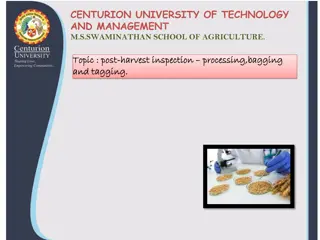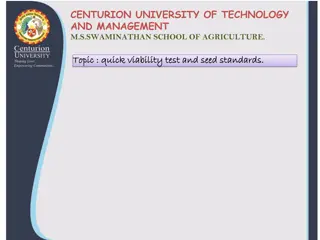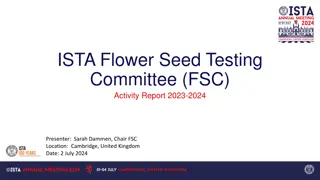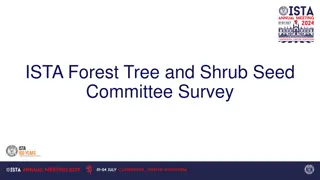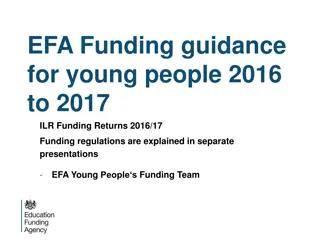Early Seed Funding and Legal Requirements
"Prashant Jain is a partner at Samisti Legal, alongside Anita Dugar as Principal Associate. Learn about the process of early seed funding, from preparing a business plan to closing formalities. Understand regulatory frameworks, instruments like private equity, and valuation of instruments under different acts and regulations."
Download Presentation

Please find below an Image/Link to download the presentation.
The content on the website is provided AS IS for your information and personal use only. It may not be sold, licensed, or shared on other websites without obtaining consent from the author.If you encounter any issues during the download, it is possible that the publisher has removed the file from their server.
You are allowed to download the files provided on this website for personal or commercial use, subject to the condition that they are used lawfully. All files are the property of their respective owners.
The content on the website is provided AS IS for your information and personal use only. It may not be sold, licensed, or shared on other websites without obtaining consent from the author.
E N D
Presentation Transcript
Prashant Jain Partner, Samisti Legal Anita Dugar Principal Associate, Samisti Legal September 18, 2020 www.samistilegal.in 9553688330 prashant@samistilegal.in, anitadugar@samistilegal.in
EARLY SEED FUNDING THE ART OF RAISING MONEY & LEGAL REQUIREMENTS..
Investment process and estimated Time Period Prepare Business Plan and Marketing Collateral (1weeks) Shortlist and evince interest from the Investors (2 weeks) Structuring of Business (2 weeks) Structuring, Valuation and Negotiation (2 weeks) Due Diligence (2 weeks) Obtain Term Sheet (1 weeks) Closing Formalities (3 weeks) Definitive Agreement (2 weeks) Funding (3 weeks) 3
Things to consider.. Identify your requirements for funds. Know your investor. How much equity to give? 4
Regulatory Framework Exchange Control Regulations Other Regulations Companies Act/Stamp Act SEBI Regulations RBI Regulations 5
Instruments Private Equity Investment Primary Investment Secondary Investment Convertible Preference Share/ Debentures Direct Equity Warrants Direct Equity 6
Valuation of Instruments Companies Act, 2013: Under Companies Act, price is determined based on valuation by a Registered Valuer (RV). Where convertible securities are issued, the resultant equity share price is determined: either upfront at the time of issue of convertible securities or Atleast 30 days prior to the date of entitlement to apply for shares, on the basis of valuation not earlier than 60 days of such entitlement. Foreign Exchange Management Act, 2013: The valuation of instruments is done as per internationally accepted pricing methodology duly certified by a Chartered Accountant or a SEBI registered Merchant Banker. Income Tax Act, 1961: The price shall not be more than the fair market value determined by a SEBI registered Merchant Banker. If shares are issued at a price in excess of the fair market value, it is taxable as per section 56(viib) under the head Income from Other Sources. Section 56(viib) is exempted to a registered Startup i.e., if the issue price is in excess of the fair market value, the amount so raised will not be taxable. 7
Definitive Agreements Non-Disclosure Agreements Term Sheet Definitive Agreement Employment Agreement for Key Employees 8
Definitive Agreements (Cont.) Confidentiality/ Non-Disclosure Agreement Covers technical, financial, legal as well as other information disclosed to the other party. Duration of confidentiality obligations 9
Definitive Agreements (Cont.) Term Sheet Background of the Company, Investors and Proposed Transaction Cost of Project, Business Plan, Current Share Holding Pattern Valuation of the Company and the shareholding required Condition Precedent Principal Covenants Anticipated level of management participation by the investor Utilization of Fund & Fresh issue of Capital Anti Dilution Rights No Pledging Investor s Share Tag Along & Drag Along Rights Right of First Refusal Liquidity Preference Proposed exit routes for investors 10
Due Diligence Financial Legal Business 11
Definitive Agreements Shareholder s and Share Subscription Agreement A Shareholders Agreement is a contract between the company s initial shareholders that goes beyond the matters addressed in the company s Articles and sets out their agreement on other issues that have the potential of leading to conflicts down the road. Some matters that are often addressed in Shareholders Agreements include: Term, structure, Issue & Subscription Management and Quorum Rights at Board meetings as well as Shareholder s meeting Business plan and utilization of funds Information rights Representation and warranties Deadlocks and its mechanisms Transfer of shares and its restrictions Call options Right of first refusal Drag along/tag along Non-compete and confidential Dispute resolution mechanism Exit Mechanism 12
Definitive Agreements (Cont.) Employment Agreement for Key Employees This agreement is recommended to govern the relation between the entity and the employees who are important and involved in core operation of the entity. Some of the clauses which are included in this agreement are as follows: Duties and Responsibilities Compensation, benefits and reimbursement policy Termination and its effects Dispute Resolution Mechanism 13
Legal Contracts Importance of Legal Contracts To provide a record of what was agreed To create rights of each party that are enforceable in law 15
Legal Contracts (Cont.) Contracts with vendors / consultants This agreement governs the relationship of the entity with its vendors from whom the entity takes certain services. Some examples of such agreements are: Service Agreements Advertisement Agreements Marketing Agreements Supply Agreements Some of the important clauses of such agreements are as follows:- Obligation and rights of the parties Commercial terms Indemnification Confidentiality and non-disclosure Intellectual Property Rights Exclusivity, Non-compete and non- solicitation Termination and Dispute Resolution 16
Legal Contracts (Cont.) Employment Contracts This agreement outlines terms and conditions of employment of the concerned employee and his key performance areas. Some of the clauses included in this agreement are: Obligations of the employee Commercial terms remuneration and bonus Confidentiality and non-disclosure Non-compete and Exclusivity Non-solicitation Intellectual Property Rights Termination Dispute resolution mechanism 17
EMPLOYEE STOCK OPTION SCHEME ESOPs Employees Stock Option Plans are designed to give stock in the entity. It is an incentive to retain or recruit top performers in the entity. These may be converted into shares upon fulfilment of certain conditions. ESOPs may be granted in the foreign companies to employees of the Indian subsidiaries subject to the guidelines of FEMA. Some of the clauses included in ESOP are as follows: Manner of acceptance of options granted The number of shares and its exercise price The vesting schedule and start date The procedures the employee must follow in order to exercise the options Effect of resignation or termination of such employees on the stock 18
Thank You! Q&A 19
Prashant Jain Email: prashant@samistilegal.in Phone: +91 9553688330 Office No. T 202, Technopolis, 1-10-74/B, Above Ratnadeep Super Market, Chikoti Gardens, Begumpet, Hyderabad, Telangana 500016 Email: info@samistilegal.in | Phone: 040 4003 2244 20







